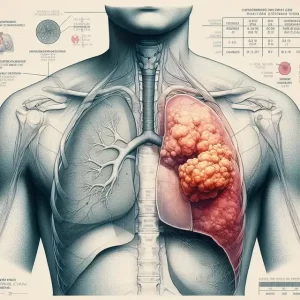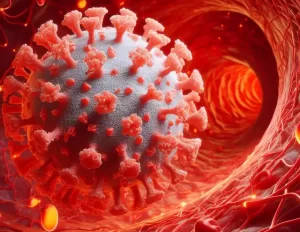Science: Feeling Hungry is enough to delay aging
- Brief Intermittent Exercise Reduces Heart Disease and Death Risk
- Personalized Lung Tumor Chips Assess PD-1 Therapy Response
- Study Shows Prior Infection Offers Strong Immunity to Original COVID-19 Strain
- Chinese Food Products Dominate Korean Tables Amid Safety Concerns
- Early Detection of Hypopharyngeal Cancer Possible with Saliva Diagnosis
- EB Virus Could Be Infected by Kiss: A Hidden Threat Linked to Cancer
Science: Feeling Hungry is enough to delay aging
- AstraZeneca Admits for the First Time that its COVID Vaccine Has Blood Clot Side Effects
- Was COVID virus leaked from the Chinese WIV lab?
- HIV Cure Research: New Study Links Viral DNA Levels to Spontaneous Control
- FDA has mandated a top-level black box warning for all marketed CAR-T therapies
- Can people with high blood pressure eat peanuts?
- What is the difference between dopamine and dobutamine?
- How long can the patient live after heart stent surgery?
Science: Feeling Hungry is enough to delay aging
The physiological needs for nutrients prompt people and animals to seek food, and diet has a significant impact on animal behavior and lifespan.
In recent years, more and more studies have shown that dietary restriction (DR) can effectively prolong lifespan and delay aging-related diseases across species.
Interestingly, the life-extending effect of dietary restriction is not only from the reduction of energy intake, but also related to some mechanisms in the animals themselves.
In May 2023, researchers from the University of Michigan published a research paper entitled: Effects of hunger on neuronal histone modifications slow aging in Drosophila in the top international academic journal Science .
This study suggests that the physiological benefits of dietary restriction are not due to the availability of nutrients, but rather to the hunger associated with food scarcity . In simpler terms, hunger alone is enough to delay aging .
According to the research team, starvation can promote changes in the brain epigenome, affecting gene expression, thereby affecting feeding behavior and aging.

Hunger is an ancient and powerful drive in animals. Therefore, the effects of diet on aging and behavior may be attributed to a biological response mechanism that exists in a wide range of species. However, the molecular nature of such “hunger signaling pathways” and how they regulate animal physiology and behavior remain unknown.
Many animals, including humans, experience protein cravings. In March 2021, Professor Xu Xianzhong from the University of Michigan and Professor Liu Jianfeng from Huazhong University of Science and Technology jointly published a research paper in the journal Nature Aging , showing that food odor alone can halve the life extension effect of nematodes induced by dietary restriction [2] .

This observation prompted the researchers to further test whether the neural state encoding the motivation to seek food is sufficient to slow aging independently of any changes in nutrient intake that might result.
In this latest study, published in Science , to test this, the research team used several methods to induce hunger in fruit flies. The first method varied the levels of branched-chain amino acids (BCAAs) in the test food and then gave the flies free access to yeast or sugary food. Flies fed a low-BCAA diet consumed more yeast than sugar than flies fed a high-BCAA diet. This preference for yeast over sugar is a measure of hunger in flies.

Branched-chain amino acid (BCAA) intake affects lifespan in Drosophila
Interestingly, low BCAA flies lived significantly longer than high BCAA flies despite consuming more calories and more total protein. That is, reducing BCAAs in the diet can induce hunger in fruit flies, and this hunger can promote fruit feeding and prolong their lifespan.
Not only that, but in order to observe the direct effect of hunger, the research team used optogenetics. When the fruit flies were exposed to red light, the neurons associated with hunger drive were activated in the body. Although these flies consumed twice as much food as flies not exposed to light stimulation, they lived longer.

Hunger alone is enough to extend life
Based on the above results, the research team speculated that hunger could promote food intake and prolong lifespan through some molecular mechanism. The research team found that specific subpopulations of Drosophila neurons utilize BCAA metabolism to modify neuronal histone acetyl bodies, and that restricting BCAA intake can promote feeding and prolong lifespan in Drosophila.
Further studies revealed that hunger stimulates feeding in Drosophila by sharply increasing the expression of histone H3.3, and that prolonged starvation seems to alter the set point of appetite regulation, thereby having a beneficial effect on aging.

Dietary BCAA alters histone acetylation and histone H3 abundance
Dr. Scott Pletcher , the corresponding author of the paper , said that unlike previous dietary restriction studies, the amount of food nutrition is not the key to the benefit of dietary restriction.
Hunger itself is sufficient to extend lifespan-motivational state itself is the decisive driver of aging factor.
Altogether, the study, published in Science , demonstrates that hunger can affect the expression levels of specific genes in the fruit flies’ brains, thereby affecting their feeding behavior and aging process.
Of course, the authors note that caution should be exercised before applying these findings to humans, but there is every reason to expect that this mechanism may be present across a wide range of species.
Paper link :
1. https://www.science.org/doi/10.1126/science.ade1662
2. https://www.nature.com/articles/s43587-021-00039-1
Science: Feeling Hungry is enough to delay aging
(source:internet, reference only)
Disclaimer of medicaltrend.org
Important Note: The information provided is for informational purposes only and should not be considered as medical advice.



